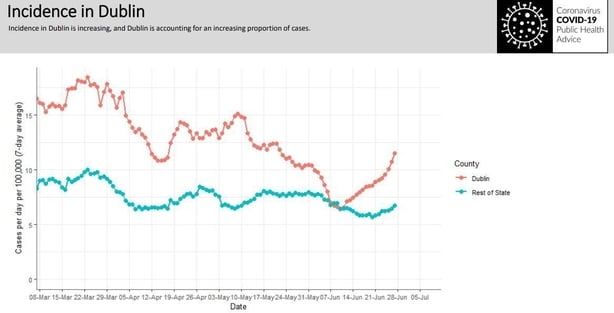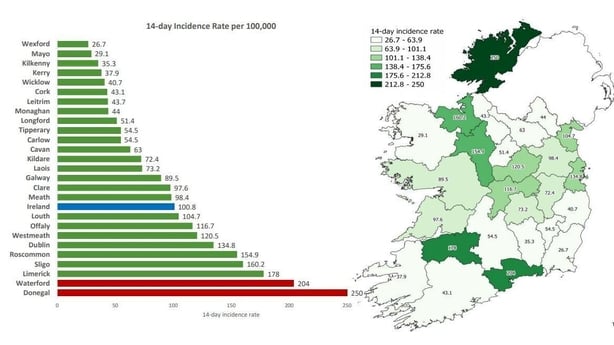The National Public Health Emergency Team's "full expectation" is that there is going to be "a significant increase in transmission" of the virus in this country, the Chief Medical Officer has said.
Dr Tony Holohan said that there is "some change now beginning to happen" in terms of the incidence of Covid-19, and the five-day average is going up.
"We see the challenges we’ve highlighted in the country including Dublin," he said.
"Our full expectation is that we’re going to see a significant increase in transmission here."
This has been the experience in the UK, he said, with Scotland seeing cases of less than 200 per day less than seven weeks weeks ago, but more than 4,000 today.
"We’re expecting a significant wave of Delta transmission," Dr Holohan said.
When asked if we are entering a fourth wave of Covid-19, Dr Tony Holohan said NPHET think they are seeing some changes in transmission that are going to lead us into another wave of infections. | Read more: https://t.co/WxNS7SbZ4Z pic.twitter.com/UqaWfP4tTB
— RTÉ News (@rtenews) July 1, 2021
The warning comes as the Department of Health reported 448 new Covid-19 cases and two further deaths.
The number of people who have died following a diagnosis of Covid-19 is now 5,000.
There are 14 people in ICU, unchanged on yesterday.
The department said that daily case numbers may change due to future data review, validation and update.
Deputy Chief Medical officer Dr Ronan Glynn has said "all of the conditions are now in place for a further wave before the autumn with excess hospitalisations and deaths".
Professor Philip Nolan said that the two unknowns were "how big" the next wave would be, and how it would translate into hospitalisations.
A positive is that they were "intervening" at a point in social re-opening and contact, where most of the contact is modest in size or else outdoors. This could help to see a "smaller wave" in this country, as a consequence, he said. Another positive is the vaccination programme, he said.
We need your consent to load this rte-player contentWe use rte-player to manage extra content that can set cookies on your device and collect data about your activity. Please review their details and accept them to load the content.Manage Preferences
Meanwhile, the situation in Dublin "is one to be watched very carefully," he said. "It was a concern last August and it's a concern now."

Dr Glynn said the National Public Health Emergency Team has "concerns" about Covid-19 numbers in Dublin.
He told this evening's briefing that the Delta variant is present "in a greater proportion" in the greater Dublin area.
He also spoke about a "very significant increase" in Co Waterford, which included a large outbreak in Dungarvan, that began in a pub and spread out to a number of settings.
There have been between 180 and 200 cases to date in the Dungarvan outbreak, he said, while there have also been large outbreaks in Sligo and Athlone.

Dr Glynn said the 14-day incidence rate per 100,000 of the population is 101.
Chief Medical Officer Dr Tony Holohan said the Delta variant would become the "dominant strain" in Europe.
He said "we're not going to stop this happening" but they are trying to slow it down as much as possible and get as much protection as possible into the population, through vaccination.
"This has been a concern for some time," he said. "It's the black cloud in an otherwise blue sky for some time."
They think they have slowed down the spread of Delta, "somewhat," he said, but would have liked to have slowed it down further.
It increased from being 27/28% of cases to 55% of cases in the space of a week, he said.
"We're going to experience very significant transmission. You've seen what’s happening in Scotland."
Chair of the Irish Epidemiological Modelling Advisory Group Professor Philip Nolan said the virus was growing at a rate of 2% per day.
Prof Philip Nolan said we are in a concerning situation as there is an increase in incidences across most age groups.
Prof Nolan said hospitalisations and ICU admissions have been stable over the past two weeks.
He said they are low but with rising incidences it will have to be monitored over the next few weeks as it is still early days when it comes to the Delta variant.
Prof Nolan said vaccines have been suppressing the disease but what's again of concern is incidences rise in some groups.
Ireland is close to 390 cases per day, he added.
The reproduction number is above 1 which is a cause for concern.
He said it is necessary to repeat the current advice and keep contacts low.
Prof Nolan said they have a good idea of the impact indoor hospitality reopening would have from the data from last summer.
He said Delta is 2.4 times more transmissible as the strain we were dealing with last summer.
Speaking at the NPHET briefing, Professor Philip Nolan said, "we have to be concerned at this point that we are at the beginning of an increase in incidence driven by the Delta variant that presents significant dangers". pic.twitter.com/VQY5lmre8W
— RTÉ News (@rtenews) July 1, 2021
Dr Ronan Glynn said public health doctors are telling NPHET that the current situation "is not like previously", as outbreaks are easily seeding across a range of settings.
"Once it gets into a community it's spreading much easier than they’ve seen previously," he said.
Referring to the international situation, he said overall incidence remains low across Europe in general but there are "some issues in a number of countries," with a 70% increase of cases in the UK week on week.
Portugal reported the highest level of cases today since February, he said, and Israel has the highest case count in over three months.
In Scotland, there were over 4,000 cases reported today, the highest new daily case count ever in that country. The positivity rate in Scotland is over 10% he said.
The "pessimistic" modelling for Scotland says there could be more than 100,000 cases a week by the middle of July, he said, and that’s with 60% of adults fully vaccinated.
"It’s not just ourselves that are concerned."
Professor Philip Nolan has said that the changing advice from the National Immunisation Advisory Committee regarding vaccines to different cohorts "doesn't make a great deal of difference" in the short term.
He told this evening's NPHET briefing that the members didn't know last week or at the weekend what the NIAC advice, delivered earlier this week, would be but they did "run some different scenarios" about different vaccine delivery schedules to difference cohorts.
"What that told us was that wouldn't make a lot of different in July and August, but could make a difference in September," he said.
Professor Philip Nolan has said that the changing NIAC advice regarding vaccines to different cohorts "doesn't make a great deal of difference" in the short term. | Read more: https://t.co/WxNS7SbZ4Z pic.twitter.com/y2IdVIOdLB
— RTÉ News (@rtenews) July 1, 2021
When tackling exponential growth, as predicted in some modelling, the important thing is to act early, he said.
"The truth is that it doesn't make a great deal of difference in the short term," he said of the change of NIAC vaccination advice, adding that the "full range of scenarios" informed the nature of NPHET's advice to Government.
Dr Tony Holohan said that, in general terms, it's sometimes better to lengthen the time between doses of a vaccine, but because of the nature of the Delta variant, the advice was to shorten that time.
The level of protection against the Delta variant offered by one dose of the AstraZeneca vaccine, in particular, but also the Pfizer vaccine, was "substantially diminished" compared to what it would have been against earlier variants, he said.
"That's why NIAC has made the advice to shorten the interval down to four weeks, so we can get these jabs in to people as quickly as possible."
The "good news," he said, is that people who have had a second dose of "whatever vaccine is due to them," have protection which is virtually as good as that which those vaccines offer to the Alpha variant.
This "underscores the importance" of people who have had one dose of any vaccine, coming forward for their second dose, Dr Holohan said.
He added that the HSE is aiming to complete the second dose of vaccines for people in the 60-69 age group "in the next two to three weeks" or so.
In relation to antigen testing, Dr Holohan said that there is no evidence to suggest that using antigen testing in an "asymptomatic population" can help reduce transmission risks of Covid-19.
"Our attitude to any intervention is neither positive or negative, it depends on what the evidence says," he said.
"If we see the evidence that shows us that using them in asymptomatic populations can help to reduce transmission risks with this disease we would respond to that. There's no such evidence that that is the case."
Antigen tests do not have "sufficiently high sensitivity" in low-prevalence situations, he said, as a means of ensuring that activities can be rendered safe, Dr Holohan said.
He said that he has "no difficulty" with the Government trying to find a way of "validating the use" of antigen testing.
He said he has a job to do which he does to the best of his ability, and to give clear advice. "I'll continue to do that. If somebody is able to show me evidence that my advice is wrong, I'm happy to look at it," he said.
If the evidence is forthcoming here or internationally that antigen testing is effective in areas where it is not being used, "then obviously we'll apply that evidence," he said.
"It’s not about antigen tests per se, it’s about how they’re used.
Dr Cillian De Gascun said that antigen tests "can have a role" in areas of high prevalence and situations such as serial testing.
Dr Ronan Glynn said that public health colleagues around the country got in touch over the last couple of weeks to say they thought it would be "inappropriate" for confirmation and first communion ceremonies to proceed.
Deputy CMO Dr Ronan Glynn said that public health colleagues around the country got in touch over the last couple of weeks to say they thought it would be "inappropriate" for Confirmation and First Communion ceremonies to proceed. | Read more: https://t.co/WxNS7SbZ4Z pic.twitter.com/XfgY1ZFvE8
— RTÉ News (@rtenews) July 1, 2021
"We wouldn't advance a view as to the worthiness of one event versus another," he said, but added that public health officials in the Midwest in recent weeks felt that such events shouldn't proceed.
Given "the nature of clusters" public health officials were seeing, he said, they thought it would be "equally inappropriate" for these ceremonies to go ahead elsewhere in the country.
"For all of those reasons it’s our public health colleagues on the ground who felt it was inappropriate and were seeking advice and guidance.
"I got in touch with colleagues across government last week and made it clear that from a public health perspective we would prefer if they would not go ahead in the coming weeks."
It comes after CEO of the Health Service Executive Paul Reid said the "vaccine programme dashboard is now available publicly".
Speaking at the HSE's weekly Covid-19 update Mr Reid said as of yesterday 67% of the population had received one dose and 45% have received two doses.
Mr Reid described vaccine uptake as "strong".
He said the HSE is "on track" to deliver 300-330,000 vaccines this week.
Meanwhile in Northern Ireland, 326 new coronavirus cases were recorded during the past 24 hours. There were no further deaths, meaning two fatalities were recorded during the entire month of June.

